- Home
- Alison Weir
Anna of Kleve, the Princess in the Portrait
Anna of Kleve, the Princess in the Portrait Read online
Anna of Kleve, The Princess in the Portrait is a work of historical fiction, using well-known historical and public figures. All incidents and dialogue are products of the author’s imagination and are not to be construed as real. Where real-life historical or public figures appear, the situations, incidents, and dialogues concerning those persons are entirely fictional and are not intended to change the entirely fictional nature of the work. In all other respects, any resemblance to persons living or dead is entirely coincidental.
Copyright © 2019 by Alison Weir
All rights reserved.
Published in the United States by Ballantine Books, an imprint of Random House, a division of Penguin Random House LLC, New York.
BALLANTINE and the HOUSE colophon are registered trademarks of Penguin Random House LLC.
Published in the United Kingdom as Anna of Kleve: Queen of Secrets by Headline Review, an imprint of the Headline Publishing Group, London.
ISBN 9781101966570
Ebook ISBN 9781101966587
randomhousebooks.com
Book design by Chris Zucker, adapted for ebook
Cover design: Victoria Allen
Cover photograph: Jeff Cottenden
v5.4
ep
Contents
Cover
Title Page
Copyright
Genealogy
Part One: Princess of Kleve
Chapter 1
Chapter 2
Chapter 3
Chapter 4
Chapter 5
Part Two: Queen of England
Chapter 6
Chapter 7
Chapter 8
Chapter 9
Chapter 10
Chapter 11
Chapter 12
Chapter 13
Chapter 14
Chapter 15
Part Three: The King’s Sister
Chapter 16
Chapter 17
Chapter 18
Chapter 19
Chapter 20
Chapter 21
Chapter 22
Chapter 23
Chapter 24
Part Four: Repudiated Wife
Chapter 25
Chapter 26
Part Five: My Lady of Cleves
Chapter 27
Chapter 28
Chapter 29
Chapter 30
Author’s Note
Dedication
By Alison Weir
About the Author
Chapter 1
1530
Anna peered through the window of the gatehouse, watching the chariot trundling through below, enjoying the rich sensuousness of the new silk gown she was wearing, and conscious of her parents’ expectations of her. At fourteen, she should have learned all the domestic graces, and to impress their guests with her virtues.
Every summer, Vater—or Duke Johann III, as his subjects knew him—brought his wife and children here to the Schwanenburg, the great palace that towered on a steep rocky hill, dominating the mighty river Rhine and the fair city of Kleve. Joining them today for a short visit were Onkel Otho von Wylich, the genial Lord of Gennep, and Tante Elisabeth, who never let anyone forget that she was the granddaughter of Duke Johann I. With them would be Otho, Onkel’s bastard son. For all the reputation of the court of Kleve for moral probity, bastards were not unwelcome there. Anna’s paternal grandfather, Duke Johann II, had had sixty-three of them; not for nothing had he been nicknamed “the Childmaker.” He had died when Anna was six, so her memories of him were vague, yet the living testimony to his prodigious fertility was all around her at court and in the great houses of Kleve. It seemed she was related to nearly everyone in the united duchies and counties of Kleve, Mark, Jülich, Berg, Ravensberg, Zutphen, and Ravenstein, over which her father ruled.
Duke Johann was lavishly dressed as usual, welcoming his guests as their chariot drew up at the gatehouse—dark hair sleekly cut, fringe and beard neatly trimmed, portly figure swathed in scarlet damask. Anna looked at him affectionately; he did love to make a show of his magnificence. At his command, his wife and children were attired in rich silks and adorned with gold chains. Anna stood in a row with her younger siblings Wilhelm and Amalia, who was fondly known as Emily in the family. Vater and Mutter had no need to remind their children to make their obeisances, for courtesy had been drummed into them since they had been in their cradles. Nor were they allowed to forget that they were royally descended from the kings of France and England, and were cousins to the mighty Holy Roman Emperor Charles V, Vater’s overlord. Their awareness of that must be reflected in everything they did.
As young Otho von Wylich stepped down, Anna’s heart almost stopped. To her, this cousin by marriage, two years older than she, seemed like a gift from God as he alighted on the cobbles. Oh, he was fair to look at, with his wavy, unruly chestnut locks and his high cheekbones, strong jaw, full lips, and merry eyes, and he was charming too as he greeted everyone, displaying the proper deference to his host and hostess, with little of the gaucheness often seen in boys of his age. When he rose from his bow to Anna, his smile was devastating.
She was already betrothed, as good as wed, and had been since the age of eleven. When people addressed her formally, they called her Madame la Marquise, for her future husband was Francis, Marquis of Pont-à-Mousson, eldest son of Antoine, Duke of Lorraine. They had never met—she had not even seen a portrait of him—and although she was always being reminded of her great destiny, the prospect of marriage still seemed unreal. Some of her dowry had already been paid, and she had long expected her wedding to take place as soon as Francis reached marriageable age at fourteen, this very year.
She had been too young for a betrothal ceremony: her consent had been implicit in the contract her father had signed. She had accepted without question the husband chosen for her, having been schooled in her duty from infancy; but now, having seen Otho von Wylich, she wished for the first time that she was not spoken for. She could not drag her eyes away from Otho’s engaging smile.
As she struggled to hide the fact that her world had just shifted seismically, Vater led the guests through the majestic Knight’s Hall, his serious, craggy features becoming animated as he pointed out the decorative sculptures to Otho.
“This hall is said to have been built by Julius Caesar,” he said proudly.
“I well remember the great ceremonies that took place here,” Tante Elisabeth said.
Slowly, they processed through the state rooms. Anna was aware only of Otho, standing just inches away, and of his eyes on her.
“We had these apartments built on the model of the great French chateaux on the Loire,” Vater boasted, waving a beringed hand at the fine furniture and tapestries. Anna saw her uncle and aunt exchange envious glances. Mutter seemed serenely unaware. All this splendor was no more than her due, for she had been a great heiress, and had brought Vater rich territories and titles. She graced the court of Kleve in a manner that was regal yet humble, as deferential as a woman should be. Both she and Vater were strict in maintaining the elaborate code of etiquette laid down by the dukes in the manner of their Burgundian ancestors; in matters of courtesy and style, the court of Burgundy had led fashionable Christendom for nearl
y a hundred years now. Mutter and Vater also welcomed new ideas from the magnificent court of France, not far to the west of Kleve, and from Italy, which permeated north by means of visitors traveling up the Rhine. Anna sometimes sensed that Vater’s court was too sophisticated and free-thinking for Mutter’s taste; it seemed much more liberal than the court of Jülich had been. But Mutter would never criticize what went on in Kleve.
When they reached the private apartments, wine was served, the sparkling Elbling that Vater regularly had brought upriver from the vineyards on the Mosel. Onkel Otho and Tante Elisabeth accepted their goblets with alacrity. It was as well that it was not evening, for the rules at court were strict, and all wine, even the Duke’s, was locked away at nine o’clock by his Hofmeister, who took his duties very seriously.
As they sipped from their goblets of finest Venetian glass, the adults talked, stiffly at first, then gradually relaxing, while their children sat silently listening, Anna intensely aware of Otho, who was sitting beside her.
“Your father has a wondrous palace,” he said.
“I hope you will be able to see more of it,” she replied. She felt sorry for him, for he had no hope of inheriting any great houses, even though it was no fault of his that he was a bastard. “But I am sure you live well in Gennep.”
“Not as well as you do here, Anna,” he told her, with another of those devastating smiles, and she thrilled to hear her name on his tongue. “But I am fortunate. My father and stepmother treat me like their lawful son. They have no other children, you see.”
“But you have friends?”
“Yes, and I have my studies, and an amiable tutor. One day, I will have to make my own way in the world, probably in the Church.”
“Oh, no!” she exclaimed, before she could stop herself. “I mean, you could surely have a happier life doing something else.”
He grinned. “You are thinking of the pleasures I would have to give up,” he said, making her blush. “Believe me, I think of them too. But I have no inheritance, Anna. It will all go to a cousin when my father dies. What else can I do?”
“Vater will find you a post here, or Dr. Olisleger, his chancellor, I am sure!”
“How kind you are, Anna,” he murmured. Their eyes met, and she read in his gaze all she could have hoped for. “I can think of nothing I would like more than being at the court of Kleve. It would mean I could see you more often.”
His words took her breath away. “Then I will ask for you,” she promised.
She noticed her mother watching them, a slight frown on her face. Vater was warming to his favorite topic. She knew for a certainty that she would hear the name Erasmus before too long. The great humanist scholar was Vater’s hero, the man he admired above all others, and whose advice he sought on religious matters.
“Erasmus says the Church is not the Pope, the bishops, and the clergy,” he declared. “It is the whole Christian people.”
Tante Elisabeth looked dubious, while Mutter’s expression remained inscrutable. Anna knew Mutter did not agree with Vater on religious matters. Devout as a nun, she was probably wincing inwardly to hear the Holy Father in Rome dismissed as if he were of no importance.
“Erasmus preaches universal peace and tolerance,” Vater went on, oblivious. “There can be no higher ideal than that. It inspires the way I live my life, the way I govern my duchy and my court, and the way I nurture my children.”
“It is a high ideal,” Onkel Otho observed, “but a dangerous one. Even if he does not intend to, Erasmus encourages those who attack the Church. It’s a short step from that to the heresies of Martin Luther.”
“Luther speaks sense in many ways,” Vater countered. “There are abuses in the Church, and they need to be rectified.”
“My lord has banned Luther’s works,” Mutter said quickly.
“I have indeed, twice,” Vater confirmed. “But some of his protests against the Church are justified. No one should have to pay priests to forgive their sins and save them from Purgatory, and it’s wrong that the princes of the Church live in luxury when our Lord was a simple carpenter. But to deny five of the sacraments is plain heresy.”
“Your son-in-law would not agree with you,” Onkel Otho replied.
“The Elector of Saxony has extreme views,” Vater said, looking pained, “and I fear Sybilla has become infected with them, for a wife is bound to follow her husband. The Elector wants me to join his Schmalkaldic League of German Lutheran princes, but I will never do that.”
“Yet you allied yourself to him by marriage,” Onkel Otho persisted. “You are linked to the League whether you like it or not.” Now it was Mutter’s turn to look pained. It must have gone against all her beliefs to see her daughter given to a Protestant.
It seemed an argument was stirring, but just then, the bell at the top of the Johannisturm in the inner courtyard chimed four o’clock, and Mutter seized her opportunity. Anna guessed she did not want her offspring hearing any more talk against the Church and the true faith in which she had nurtured them.
“Children,” she said brightly, “why don’t you show your cousin Otho around the rest of the castle?”
The young people all jumped to their feet, Anna secretly rejoicing.
“It will be our pleasure,” thirteen-year-old Wilhelm said earnestly. Anna knew Otho would soon be receiving a lecture on the architecture of the Schwanenburg and the glorious history of Kleve—and she was right. As they returned through the state apartments, Wilhelm, who had all the virtues save a sense of humor, humility, and empathy with others, started waxing forth on how he had been born here in the Schwanenburg and how rich and prosperous the duchy was.
“Our father is called Johann the Peaceful, because he rules so wisely,” he boasted. “When he married our mother, she brought him Jülich and Berg, and lands stretching for four thousand miles. When I am duke of Kleve, I will inherit all that, and I will be as wise as my father.”
Anna saw Otho smothering a smile.
“Otho did not come to hear all this, Bruder,” she said. “It’s a beautiful day, and you’ve been excused lessons for the afternoon.” She turned to Otho, and felt herself grow hot. “Would you like to go up the Schwanenturm? The views are wonderful, and I can tell you all about the legend of Lohengrin.”
“It’s too warm to climb all those stairs,” Emily protested, her rosebud lips pursed in a pout.
“Emily, you are such a lazybones,” Anna sighed.
“But I should love to see the views,” Otho said, his twinkling eyes still on Anna, “and the exercise will be good for us.”
“I think Otho would prefer to see the Spiegelturm,” Wilhelm said, as if Otho had not spoken. “The ducal archives are most interesting.”
“Oh, Wilhelm, it’s always what you want!” Emily cried.
“You can take Otho there afterward,” Anna said firmly. “But first, he wants to see the Schwanenturm.”
“Then you take him,” Wilhelm ordered. “I will go and look out some things I want to show him.”
“I’m coming with you,” Emily said. “I can help find them.”
“You’re just too lazy to climb the stairs,” Wilhelm scoffed, looking none too pleased at the prospect of his twelve-year-old sister’s company.
“Come,” Anna said to Otho. “Let’s leave them to their squabbles.” She led him away before Wilhelm could stop her. She had never known such luck. Her life was hemmed around with rules, ritual, sewing, and her mother’s endless vigilance, and the chance of a short time alone with this most handsome youth was beyond her wildest imaginings; it was incredible that it had been afforded her so easily, without any effort on her part. It was an escapade of which Mutter might well have disapproved, for she had always enjoined that a young lady should never be alone with a man, lest her reputation be compromised. She had never explained exactly how that might happen, though it was
clearly a dreadful thing. But Otho did not count, surely? He was family, and he was not much older than Anna.
The mighty Schwanenturm loomed above them, its square shadow falling on the cobbled courtyard. Anna was headily aware of Otho walking just a pace behind her. She was glad she had donned her new red silk gown with its gold bodice embroidered with loops of pearls. She felt beautiful wearing such a dress, with her fair hair loose down her back. Sybilla, whose portrait showed off the slanting eyes and long golden tresses that had captivated the Elector, was the beauty of the family, everyone was agreed on that; but Anna reveled in the thought that she too could look pleasing.
The guards on duty at the door stood to attention as they approached.
“My ancestor, Duke Adolf, built this tower,” Anna said, pushing open the heavy door.
“Allow me,” Otho said, taking its weight. Anna went ahead, lifting up her gorgeous skirt to ascend the stairs.
“The old tower fell down about a hundred years ago,” she went on, trying to conceal her nervousness behind a barrage of facts. “Duke Adolf rebuilt it much bigger than before.”
“It’s certainly high!” Otho said. “These steps go on forever. Shall we rest for a moment?”
Anna turned on the stairs to see him looking up admiringly at her.
“You are very pretty,” he said, “and that gown becomes you so well.” His eyes traveled up appreciatively from her slender waist to the swell of her breasts beneath the velvet bodice.
Thrilled by his praise, she smiled down at him. She could not help herself. She knew she should not be allowing him to say such familiar things to her, or herself to acknowledge them. Yet she was bursting with such joy that she had no will to walk away, or to spoil the moment.

 Richard III and the Princes in the Tower
Richard III and the Princes in the Tower Britain's Royal Families: The Complete Genealogy
Britain's Royal Families: The Complete Genealogy The Lady in the Tower: The Fall of Anne Boleyn
The Lady in the Tower: The Fall of Anne Boleyn Six Wives of Henry VIII
Six Wives of Henry VIII Elizabeth of York: A Tudor Queen and Her World
Elizabeth of York: A Tudor Queen and Her World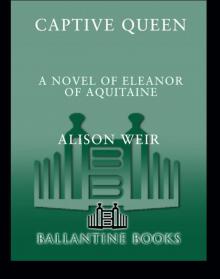 Captive Queen
Captive Queen Innocent Traitor
Innocent Traitor The Marriage Game
The Marriage Game A Dangerous Inheritance
A Dangerous Inheritance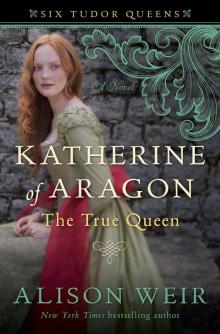 Katherine of Aragón: The True Queen
Katherine of Aragón: The True Queen The Marriage Game: A Novel of Queen Elizabeth I
The Marriage Game: A Novel of Queen Elizabeth I Princes in the Tower
Princes in the Tower Anne Boleyn: A King's Obsession
Anne Boleyn: A King's Obsession Traitors of the Tower
Traitors of the Tower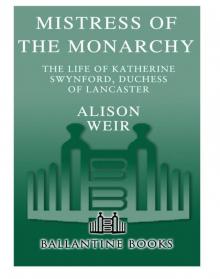 Mistress of the Monarchy: The Life of Katherine Swynford, Duchess of Lancaster
Mistress of the Monarchy: The Life of Katherine Swynford, Duchess of Lancaster Queens of the Conquest: England’s Medieval Queens
Queens of the Conquest: England’s Medieval Queens Eleanor of Aquitaine: A Life
Eleanor of Aquitaine: A Life Mary, Queen of Scots, and the Murder of Lord Darnley
Mary, Queen of Scots, and the Murder of Lord Darnley Henry VIII: The King and His Court
Henry VIII: The King and His Court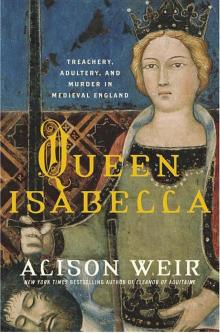 Queen Isabella: Treachery, Adultery, and Murder in Medieval England
Queen Isabella: Treachery, Adultery, and Murder in Medieval England Katheryn Howard, the Scandalous Queen
Katheryn Howard, the Scandalous Queen Arthur- Prince of the Roses
Arthur- Prince of the Roses The Wars of the Roses
The Wars of the Roses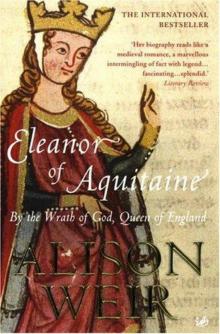 Eleanor of Aquitaine: By the Wrath of God, Queen of England
Eleanor of Aquitaine: By the Wrath of God, Queen of England Mary Boleyn: The Great and Infamous Whore
Mary Boleyn: The Great and Infamous Whore Jane Seymour: The Haunted Queen
Jane Seymour: The Haunted Queen Anna of Kleve, the Princess in the Portrait
Anna of Kleve, the Princess in the Portrait Lancaster and York: The Wars of the Roses
Lancaster and York: The Wars of the Roses The Grandmother's Tale
The Grandmother's Tale The Princess of Scotland (Six Tudor Queens #5.5)
The Princess of Scotland (Six Tudor Queens #5.5) The Lady Elizabeth
The Lady Elizabeth Katherine Swynford: The Story of John of Gaunt and His Scandalous Duchess
Katherine Swynford: The Story of John of Gaunt and His Scandalous Duchess The Curse of the Hungerfords
The Curse of the Hungerfords The Lost Tudor Princess: The Life of Lady Margaret Douglas
The Lost Tudor Princess: The Life of Lady Margaret Douglas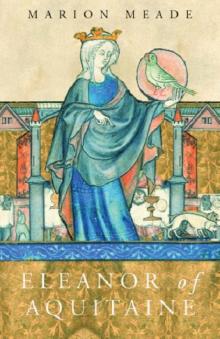 Eleanor of Aquitaine
Eleanor of Aquitaine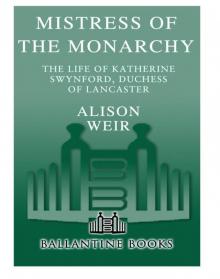 Mistress of the Monarchy
Mistress of the Monarchy The Lost Tudor Princess
The Lost Tudor Princess Henry VIII
Henry VIII Anne Boleyn, a King's Obsession
Anne Boleyn, a King's Obsession A Dangerous Inheritance: A Novel of Tudor Rivals and the Secret of the Tower
A Dangerous Inheritance: A Novel of Tudor Rivals and the Secret of the Tower Elizabeth of York
Elizabeth of York Katherine of Aragon, the True Queen
Katherine of Aragon, the True Queen Katherine Swynford
Katherine Swynford Wars of the Roses
Wars of the Roses Queens of the Conquest
Queens of the Conquest Mary Boleyn
Mary Boleyn Britain's Royal Families
Britain's Royal Families The Tower Is Full of Ghosts Today
The Tower Is Full of Ghosts Today Life of Elizabeth I
Life of Elizabeth I Anne Boleyn A King's Obssession
Anne Boleyn A King's Obssession Lancaster and York
Lancaster and York Jane Seymour, the Haunted Queen
Jane Seymour, the Haunted Queen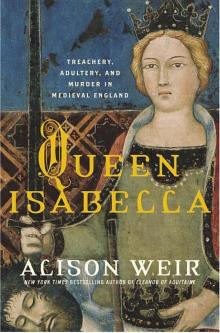 Queen Isabella
Queen Isabella The princes in the tower
The princes in the tower